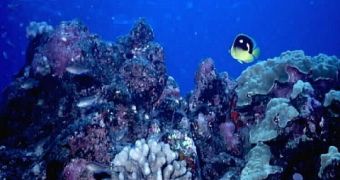A team of researchers working with the Wildlife Conservation Society and the University of Azores recently investigated how our remaining coral reefs are responding to the changing dynamics of their surrounding environment.
Thus, they found that, apart from affecting coral reefs directly, pollution and heavy fishing also cause microbes, sponges and worms to prosper in marine ecosystems. As was to be expected, these organisms contribute even more to the degradation of coral reefs.
The scientists explain that, as a result of various human activities which translate into altered sea chemistry, simple organisms such as bacteria, fungi and algae now have much more nutrients at their disposal, something which allows them to develop and eat away at our coral reefs.
On the other hand, overfishing leads to underwater species such as sponges and worms no longer having many natural predators. This fosters a boost in their population, and reefs systems eventually fall victim to their ever increasing numbers.
The official website for the Wildlife Conservation Society quotes Dr. Carreiro-Silva from the University of Azores, who argues that, “This change in the roles of worms and sponges shows how the effects of fishing can cascade down even into the hidden crevices of coral reefs.”
Given the fact that our planet's coral reefs are already under continuous threat as a result of rising sea temperatures and ocean acidification (i.e. a phenomenon which weakens the corals by affecting their skeletons), the researchers fear that this proliferation of underwater microbes, sponges and worms might eventually deliver the final blow to our marine ecosystems.
Although their studies focused on the rather old marine parks found close to Kenya, it is our belief that their findings are accurate and can be used to make predictions concerning the future of our planetary reef systems.
As Dr. Carreiro-Silva puts it, ““Ultimately, the synergy between these different impacts may lead to the deterioration and eventual collapse of the reefs unless greater efforts are made to reduce the many sources of pollution and excessive use of coral reefs as fisheries.”
The study can be found in the online edition of “Marine Ecology Progress Series.”

 14 DAY TRIAL //
14 DAY TRIAL //